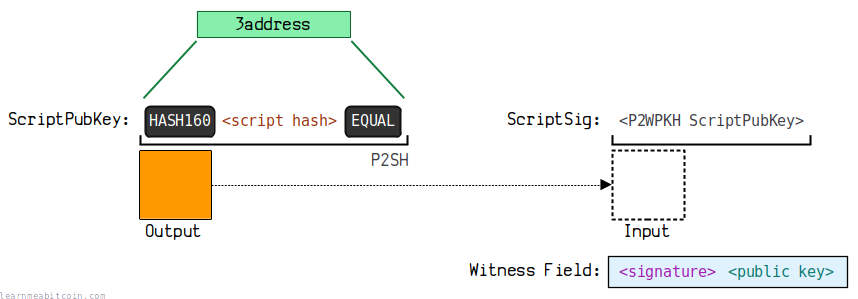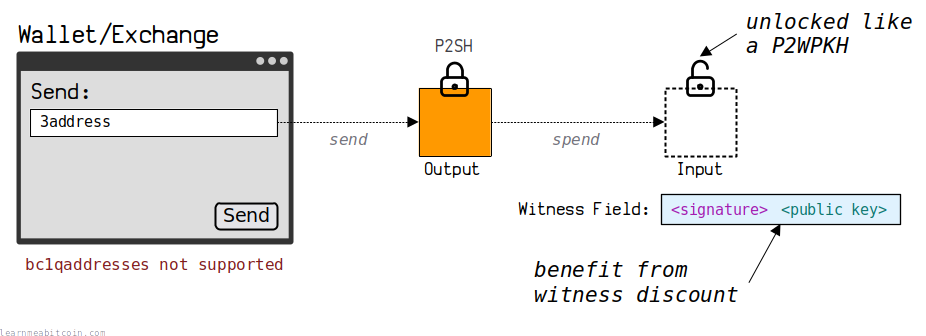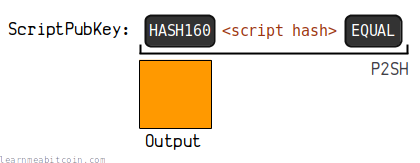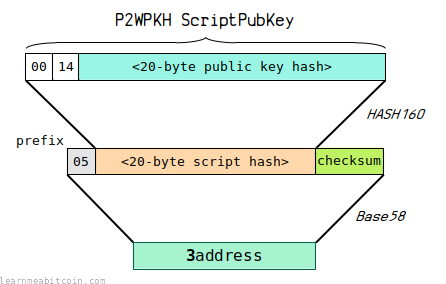OP_HASH160
OP_PUSHBYTES_20
6d3ed4cf55dc6752a12d3091d436ef8f0f982ff8
OP_EQUAL
P2SH-P2WPKH
P2WPKH wrapped in a P2SH

P2SH-P2WPKH (also known as Nested P2WPKH) is a locking script type that wraps a modern P2WPKH inside a legacy P2SH.
It allows you to send bitcoins to a legacy 3address (P2SH), but also take advantage of the cheaper transaction fee costs that come from spending a modern P2WPKH output.
Therefore, P2SH-P2WPKH provides a stepping-stone until wallets and exchanges support sending directly to bc1qaddresses.
There's no reason to use P2SH-P2WPKH if you have the option to use P2WPKH directly. P2SH-P2WPKH is only useful if you cannot send to a bc1qaddress from your wallet or exchange, but can send to a 3address instead.
Purpose
Why does P2SH-P2WPKH exist?

The new P2WPKH locking script introduced in the Segregated Witness upgrade is unlocked via the witness field of a transaction.
The witness field provides a discount in terms of how much space it takes up in a block. As a result, it costs less in fees to spend a P2WPKH compared to a legacy P2PKH (which is unlocked via the ScriptSig field and doesn't provide a discount).
So you'd prefer to use P2WPKH over the legacy P2PKH if you have the choice.
However, wallets and exchanges may not have implemented the functionality to send to P2WPKH (bc1qaddresses) when Segregated Witness was first activated in 2016. Therefore, P2SH-P2WPKH provides the option to send to a P2SH (3address) instead, whilst also being able to spend the output as if it was a P2WPKH later on.
As a result, P2SH-P2WPKH allows you to take advantage of the witness discount provided by P2WPKH, even if the wallet or exchange you're using does not allow you to send to bc1qaddresses.
Nested P2WPHK is just the normal P2WPKH embedded within a P2SH, to make it compatible with older wallets which don't recognize native witness addresses (bech32).
- Wallets and exchanges need to support the new Bech32 address format to be able to allow users to send to P2WPKH.
- The use of P2SH-P2WPKH has decreased over time as wallets and exchanges introduced the functionality to support P2WPKH.
- Almost all modern wallets and exchanges now support sending to P2WPKH, so P2SH-P2WPKH has become more of a relic of the past. However, it's still a standard locking script method, so you can still use it if you want to.
Usage
How does P2SH-P2WPKH work?
P2SH-P2WPKH is one of the more complex scripts to understand.
The ScriptPubKey is a standard P2SH, but to unlock it you need to use both the ScriptSig and Witness field of a transaction.
ScriptPubKey

The ScriptPubKey is a standard P2SH locking script. For example:
a9146d3ed4cf55dc6752a12d3091d436ef8f0f982ff887Transaction: 021e23df3cdb8b504bec1a3f7a382a83be7518354bac2331076753b5b4755a4e (Output 0)
The script hash is the HASH160 of a P2WPKH ScriptPubKey. For example:
P2WPKH ScriptPubKey: 001402c8147af586cace7589672191bb1c790e9e9a72 HASH160: 6d3ed4cf55dc6752a12d3091d436ef8f0f982ff8
The original P2WPKH ScriptPubKey will be revealed in the upcoming ScriptSig.
The fact that P2SH-P2WPKH uses a standard P2SH ScriptPubKey is what makes it backwards-compatible. Most wallets and exchanges should support sending to a P2SH (3address).
ScriptSig

The ScriptSig contains a 22-byte data push of a P2WPKH ScriptPubKey.
OP_PUSHBYTES_22
001402c8147af586cace7589672191bb1c790e9e9a72
16001402c8147af586cace7589672191bb1c790e9e9a72Transaction: a55bd4d4ebd319ab2990c356e16cab1eeb52a93c414b869a606dc0add61d725a (Input 0)
This data push is a complete P2WPKH ScriptPubKey. In other words, it's the ScriptPubKey you would have used if you were using P2WPKH directly.
For the execution of this script type to continue successfully, the HASH160 of this data push must match the script hash in the ScriptPubKey.
The fact that the ScriptSig contains a further P2WPKH inside it is why this is sometimes referred to as a "Nested P2WPKH".
Witness

The witness field contains the signature and public key required to unlock the P2WPKH ScriptPubkey inside the ScriptSig.
304402201f85ab44217563b4ce9d11e4c7b00dc59dd102099eb250634f4b6906276ba07702206147cc98f29c5fcbad925b5e40fe154f4d429f9569f292f9298f615c4940044501
022ae7dd28111380c100301f5e9797383e291234c341d7a242202a6def9069181c
{
"stackitems": "02",
"0": {
"size": "47",
"item": "304402201f85ab44217563b4ce9d11e4c7b00dc59dd102099eb250634f4b6906276ba07702206147cc98f29c5fcbad925b5e40fe154f4d429f9569f292f9298f615c4940044501"
},
"1": {
"size": "21",
"item": "022ae7dd28111380c100301f5e9797383e291234c341d7a242202a6def9069181c"
}
}
0247304402201f85ab44217563b4ce9d11e4c7b00dc59dd102099eb250634f4b6906276ba07702206147cc98f29c5fcbad925b5e40fe154f4d429f9569f292f9298f615c494004450121022ae7dd28111380c100301f5e9797383e291234c341d7a242202a6def9069181cTransaction: a55bd4d4ebd319ab2990c356e16cab1eeb52a93c414b869a606dc0add61d725a (Input 0)
This data is executed against the P2WPKH ScriptPubKey in the ScriptSig, just as it would be for a direct P2WPKH.
The structure of the Witness field for a P2SH-P2WPKH is exactly the same as it is for a direct P2WPKH.
P2SH-P2WPKH uses compressed public keys only. This is different to legacy P2PKH, where both uncompressed and compressed public keys can be used.
Summary
A P2SH-P2WPKH is unlocked in two steps:
- The ScriptPubKey is unlocked by the ScriptSig. This is done by providing a data push (a P2WPKH ScriptPubKey) that hashes to the script hash in the ScriptPubKey.
- The ScriptSig is unlocked by Witness. This is done by providing the signature and public key needed to unlock the P2WPKH ScriptPubKey in the ScriptSig.
It's a bit confusing I know. I think it's the fact that the ScriptSig actually contains a ScriptPubKey inside it, and that's what throws most people off.
But don't be put off, because as I say it isn't executed like a typical P2SH.
P2SH-P2WPKH (and P2SH-P2WSH) work differently to other scripts in Bitcoin. They are special cases that trigger additional rules compared to other scrips.
Costs
How much cheaper is it to use P2SH-P2WPKH over legacy P2PKH?
The following table shows the number of bytes required to unlock a legacy P2PKH, a P2SH-P2WPKH, and a modern P2WPKH:
| Script Type | ScriptSig (bytes) | Witness (bytes) | Total (bytes) |
|---|---|---|---|
| P2PKH | 107 | 0 | 107 |
| P2SH-P2WPKH | 23 | 107 | 130 |
| P2WPKH | 0 | 107 | 107 |
Note: The size of signatures can vary slightly in size, but these sizes are the most typical.
As you can see, P2SH-P2WPKH actually requires more bytes to unlock than a legacy P2PKH or modern P2WPKH.
However, the size calculation of a transaction was adjusted during the Segregated Witness upgrade to use virtual bytes instead. This new virtual bytes measurement gives a discount to the bytes in the witness field, where each byte in the witness only takes up 0.25 virtual bytes of space.
The following table shows the number of virtual bytes required to unlock the same scripts:
| Script Type | ScriptSig (virtual bytes) | Witness (virtual bytes) | Total (virtual bytes) |
|---|---|---|---|
| P2PKH | 107 | 0 | 107 |
| P2SH-P2WPKH | 23 | 26.75 | 49.75 |
| P2WPKH | 0 | 26.75 | 26.75 |
Note: The number of bytes in the witness have been multiplied by 0.25.
So even though the spending of a P2SH-P2WPKH requires more bytes overall, the discount given to the bytes in the witness field means that a P2SH-P2WPKH uses fewer virtual bytes compared to a legacy P2PKH.
And seeing as the amount you pay in transaction fees is calculated in sats per virtual byte, it works out cheaper to spend a P2SH-P2WPKH than a legacy P2PKH.
You get the benefits of segwit (with a small penalty, the P2SH wrapping has a cost), but you get to receive coins from senders who do not support native segwit addresses.
P2WPKH is the cheapest. But if that's not an option, P2SH-P2WPKH is cheaper than legacy P2PKH.
Sending
There isn't much difference in the amount of space used when sending bitcoins to a P2PKH, P2SH-P2WPKH, or P2WPKH.
This is the amount of bytes required to lock an output (i.e. "send") to each of these ScriptPubKey patterns:
| Script Type | ScriptPubKey (bytes) |
|---|---|
| P2PKH | 25 |
| P2SH-P2WPKH | 23 |
| P2WPKH | 22 |
And seeing as the ScriptPubKey field does not get a discount, they take up the same amount of space in terms of virtual bytes:
| Script Type | ScriptPubKey (virtual bytes) |
|---|---|
| P2PKH | 25 |
| P2SH-P2WPKH | 23 |
| P2WPKH | 22 |
So compared to a legacy P2PKH, the primary savings in terms of transaction fees comes when you spend a P2SH-P2WPKH or P2WPKH.
Address
How do you create an address for a P2SH-P2WPKH?

P2SH-P2WPKH locking scripts have a 3address.
This is because it uses P2SH for the ScriptPubKey, so it has the same address format as any other P2SH.
To create the address, you start by constructing the P2WPKH ScriptPubKey you want to use. You then hash this using HASH160 to create the 20-byte script hash. Finally, you Base58Check encode this script hash using the prefix 05 to signify a P2SH address (which is what gives it a 3 at the start of the address).
For example, the hex-encoding of the P2WPKH ScriptPubKey placed in the ScriptSig in the example above is:
001402c8147af586cace7589672191bb1c790e9e9a72
If we hash this using HASH160 we get:
6d3ed4cf55dc6752a12d3091d436ef8f0f982ff8
And if we convert this to Base58Check using the prefix 05 we get:
3Beer3irc1vgs76ENA4coqsEQpGZeM5CTd
It's not possible to identify a P2SH-P2WPKH from the address alone. The only way you can identify that a 3address uses Nested P2WPKH is when it gets spent, as that's when it reveals the P2WPKH locking script wrapped inside the ScriptSig.
Summary
P2SH-P2WPKH (Nested P2WPKH) was created to take advantage of the cheaper spending costs of P2WPKH, even if the wallet or exchange you're using does not allow you to send to P2WPKH directly (bc1qaddress).
As a compromise, you can send bitcoins to a P2SH (3address) instead, then spend the output later on as if it was a P2WPKH. This means the output is unlocked via the witness field, and the discount provided by this witness reduces the costs in terms of transaction fees.
But now that P2WPKH is widely adopted, there is no longer much use for the old P2SH-P2WPKH.
It was useful in a time before most wallets supported segwit, as even those that did not usually supported P2SH.
The most annoying interesting aspect of P2SH-P2WPKH (aside from the lengthy acronym) is how it uses both the ScriptSig and Witness field to be unlocked. This makes it a multi-step unlocking process, and is naturally more complex than a straightforward P2PKH or P2WPKH.
This is especially annoying if you're parsing the blockchain or working on a blockchain explorer, as it adds yet another locking script type to identify and handle. It ends up turning the ScriptSig from just being the "unlocking code" field in to a "locking code" field as well, which is a bit weird.
So don't worry if you find this script type difficult to understand — I did too (and still do).
I actually put off writing this page for a long time (Segwit was released in 2016, and I wrote this page in 2025), as I hoped that P2SH-P2WPKH would fade in to obsolescence over the years so that I wouldn't have to go through the rigmarole of explaining how it works. But P2SH-P2WPKH is going to live in the blockchain forever, so we might as well get the hang of them at some point.
Ideally it would have been easier to migrate directly from P2PKH to P2WPKH without having P2SH-P2WPKH thrown in as a backwards-compatible stepping stone, but it served its purpose while wallets and exchanges implemented the new Segregated Witness features.
It was all for a more pleasant user experience. We just have to deal with the complexity.
I actually use P2SH-P2WPKH for the donation address on this website.
The simple reason being that the old Base58 address format (which P2SH uses) allow me to create a vanity address with the word "Beer" at the start. But I can't do this with the new Bech32 address format (which P2WPKH uses), because it doesn't allow you to use the letter "b" in the main part of the address.
So yes, I'm using P2SH-P2WPKH instead of P2WPKH and paying slightly more in fees just because I want to have the word "Beer" in my donation address.
You're welcome.